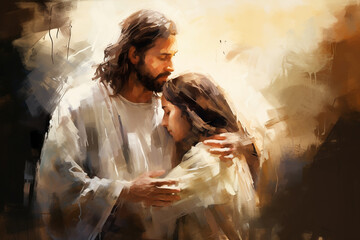“…a woman with an issue of blood,” Luke 8:43a
It happened at summer camp when I was 11 years old. It wasn’t the first time, but it was definitely the first in a series of experiences that were to forever define womanhood and my struggle with it. I thought I had wet my pants. I was having breakfast in the cafeteria with all the other campers in my cabin, and I quickly went to the bathroom. I discovered something I just wasn’t prepared for. Red…and lots of it. I started to wipe as tears streamed down my face. I knew what it was of course. I had learned at school, my mom had explained a lot, and I had a very light spotting a couple months earlier. But not this. This was…everywhere.
A counselor came in and knocked on the door. A mature college-aged lady with pretty brown hair. “Sweetie, are you ok?” she called to me. I choked out that I’d gotten my period. With a soothing voice, she said, “Ok, I’ll be right back.” She left for several minutes, as I stared at the mess before me. She brought in a pad and handed it over the door. I grabbed it and put it on. She then brought me a sweater to tie around my waist to hide the red and walked me back to my cabin for a change of clothes. That was it for swimming that week, and I had the worst cramps I could have imagined. But I did not grow up in a time when girls sat things out while on their periods, so I was still expected to go bike riding and play soccer and all the other activities that camp entails. Every pair of underwear and pants I owned came home red.
In the years that followed, my periods never came with any regularity, and I never was able to keep them from going through my clothes. They were somewhat rare to begin with, but when they never became regular, my mother took me to the doctor. The doctor prescribed birth control pills, which my mom was determined to refer to as “hormones.” As a mom now, I can understand why. The pills would regulate everything and let me have a lighter cycle, they said. Oh how untrue that turned out to be. I felt like I was hemorrhaging every minute of the day for weeks on end. I stopped the pills and decided to just get used to being irregular and never knowing when it would happen. Later in high school, I did try birth control pills again with the same results. “Hormones” weren’t going to be a fix for me.
It’s a wonder I was able to get pregnant naturally at all because it had been over a year since I’d had a period when I got the news that I was six weeks pregnant. Of course, it’s generally easier to get pregnant when you aren’t trying to. When my daughter was six, I began to have trouble with constant spotting. I felt as if it would go on forever. I went to the doctor again, and again, they tried birth control. If I thought it was bad dealing with unstoppable bleeding as a student, it was nothing compared to what it was like with a class of kindergarteners I couldn’t leave unsupervised. It was the most miserable few months of my life trying to get that under control. It got so bad that I became anemic and could barely walk from one end of my classroom to the other without feeling like I would pass out. I can’t imagine what that biblical woman was going through when she bled for twelve years. Not to mention that, under the Law of Moses, the condition made her a complete outcast in the Jewish community.
Fast forward a few years, and I’m no longer bleeding, but I’m also not able to have the second child I have desperately wanted. I haven’t had a natural period in almost 4 years at this point. When you want to conceive but your body won’t cooperate, it’s a lonely feeling. At this point, I can definitely say that whether I’m bleeding or not, I am “a woman with an issue of blood.” For many of us, we are told that we are women when that first period comes, but that flow doesn’t really define womanhood. Maybe it’s part of our role as sexual and reproductive beings, but it’s not what being a woman is really about. The original “woman with the issue of blood” was healed through her faith in Jesus (Luke 8:48), and that’s a testament to what biblical womanhood is really about. It’s not about our biological ability to bear children, even if we may feel like that role defines us sometimes. Biblical womanhood is about faith.
Whether we want children or not, periods are definitely a subject every woman has discussed at least a few times. And the world will give us very mixed views on what we should want as women in that regard. We should all want to be mothers, but we can’t want to “just” be mothers. While motherhood is a beautiful role and many of us are called to it, it doesn’t define biblical womanhood. But if that doesn’t define womanhood, what does? Let’s look at a few women of the Bible to see what they can teach us about womanhood.
- Eve was a redeemed sinner.
Eve was the mother of all living people, but we mostly remember her for her disobedience to God. She was the first person to ever sin and be cast from God’s presence. She was also the first woman to receive the promise of the Savior. This is significant. If we don’t remember that we are sinners in desperate need of a Savior, nothing else matters. “For all have sinned and fall short of the glory of God.” Romans 3:23.
- Mary of Nazareth was the Lord’s servant.
Mary often seems a beautiful and serene figure to our 21st century eyes with a more holistic view of her story, but her experience was probably far from beautiful or serene. She was visited by an angel before she was married and told she would have a Son much sooner than expected. Later, she would give birth in a stable surrounded by animals. Being pregnant out of wedlock still carries a certain stigma, but it’s nothing compared to what it meant in Mary’s day. I also can’t imagine having given birth in a barn full of animals and then to be immediately visited by a bunch of men I didn’t know (the shepherds). But Mary’s reply to the angel was, “Behold, I am the servant of the Lord; let it be to me according to your word.” Luke 1:38
- Elizabeth was the first Christian.
Mary visited her cousin Elizabeth while she was in her first trimester of pregnancy. Elizabeth neither knew Mary was coming beforehand, nor did she know Mary was even pregnant. But the Spirit filled her as soon as Mary entered her home, and she exclaimed, “And why am I so honored that the mother of my Lord should come to me?” Luke 1:43. Elizabeth was the first person to verbally acknowledge Jesus as the Messiah, as Lord, and claim Him as her own. This is what it takes to receive salvation and become a Christian. “That if you confess with your mouth that Jesus is Lord and believe in your heart that God raised him from the dead you will be saved.” Romans 10:9.
- Mary of Bethany was a disciple.
When Jesus visited his friend Mary and her sister Martha in Bethany, Mary took the position at His feet to listen and learn from Him (Luke 10:39). This was a position used by disciples in many ancient cultures, including Ancient Jewish culture. Jesus commended Mary’s decision to sit at His feet and learn from Him (Luke 10:42). Disciple is the Greek word for student. Mary took the position of a student of Jesus. That’s what a disciple does. We are accustomed to hearing about the twelve male disciples closest to Jesus, but He had many who chose to learn from Him. Mary was one of them. In Matthew 11:29, Jesus speaks to a large crowd of men, women, and children gathered in Galilee, “Become my servants and learn from me. I am gentle and free of pride. You will find rest for your souls.”
- Mary Magdalene was the first apostle.
Don’t misunderstand me when I say apostle. She was not one of THE TWELVE apostles. She was not listed among that group, but she did meet the qualifications for apostleship before anyone else. The New Testament shows the original apostles as those who (1) had known Christ during his earthly ministry, (2) were an eye witness of Jesus’ resurrection, and (3) were called and commissioned by Christ. Mary meets all of the criteria. Jesus Himself cast seven demons out of her during His travels (Luke 8:2). She was the first person Jesus appeared to when He rose from the dead (John 20:16). He then commissioned her to go and tell His disciples that He had risen (John 20:17). In Greek, apostle means messenger or “one who is sent out.” Mary did go and tell the disciples that she had seen the risen Christ (John 20:18). Today, apostles are those who simply tell the good news – the gospel. We are the messengers of Christ in the fallen world. “ Go and make disciples of all nations, baptizing them in the name of the Father, and of the Son, and of the Holy Spirit, teaching them to observe all that I have commanded you.” Matthew 28:19-20.
So how does the Bible – how does God – define a woman? She is a sinner redeemed by Christ and healed by her faith in Him. She believes in Jesus as her personal Savior and uses her words to declare it. She is the Lord’s servant. She is a disciple who learns from the ultimate teacher, Jesus Christ. She is an apostle – a messenger sent to tell others about her Savior. She is worthy because Jesus made her so.


Leave a Reply